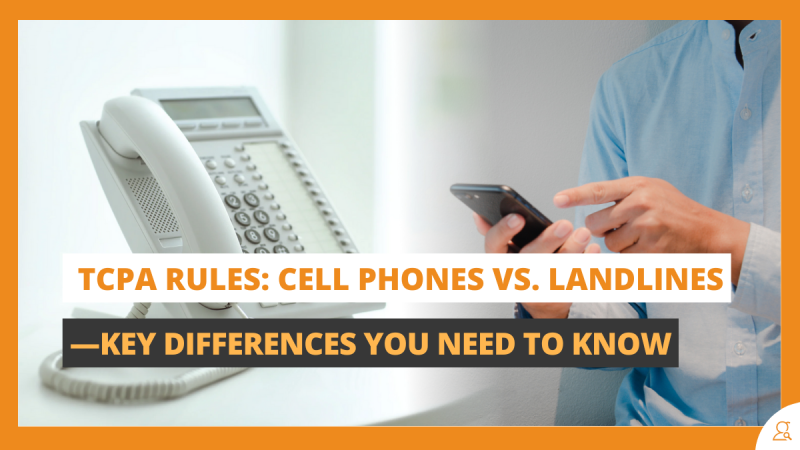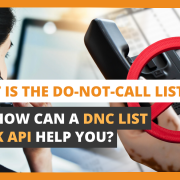08
TCPA Rules: Cell Phones vs. Landlines—Key Differences You Need to Know
Did you know that TCPA rules differ from cell phone to landline? Knowing what types of calls are legal to make can help you maximize your phone marketing success while also keeping you compliant and free from lawsuits.
The Telephone Consumer Protection Act (TCPA) was designed to protect consumers from unwanted or intrusive calls. While most people are aware of the restrictions it places on robocalls and telemarketing, fewer understand that the TCPA treats cell phones and landlines differently. For businesses that use phone numbers for marketing, customer outreach, or automated dialing, knowing these distinctions is essential for compliance and for maintaining customer trust.
Here is what you need to know about the two line types and tools you can use to maintain accurate phone data.
TCPA Rules for Cell Phones
When it comes to cell phones, there are certain TCPA requirements that must be met before marketing calls can be made legally.
The first is prior express written consent. Businesses must obtain written permission before making autodialed or prerecorded marketing calls or sending text messages.
The second is the scope of consent. Consent must clearly disclose the type of messages or calls being authorized—for example, promotional or informational.
Third, businesses must not make any autodialed calls without consent. Calls or texts made with an automatic telephone dialing system (ATDS) to cell phones are generally prohibited without prior express consent.
Finally, these same requirements apply to text message communication. The TCPA explicitly covers SMS and MMS messages, treating them the same as phone calls.
TCPA Rules for Landlines
Landline calls are subject to a different standard.
Businesses must still obtain prior express written consent for prerecorded or artificial voice marketing messages (telemarketing calls). However, informational calls like automated calls that are used for appointment reminders, school closings, utility notifications, etc. do not require prior consent if placed to a residential landline.
There are also fewer restrictions on manual dialing. Manually dialed calls to landlines for marketing purposes are generally allowed, as long as the National Do Not Call (DNC) Registry is respected. Consumers can register their home and mobile phone numbers on the DNC list to opt out of all telemarketing calls. If you register your number and still receive an unwanted call, you can report it to the Federal Trade Commission (FTC). Businesses that do not honor the DNC registry face hefty fines set per call.
Why the Differences in TCPA Rules Matter
Cell phones are considered more personal, more frequently used, and more often tied to costs for the consumer. Landlines, on the other hand, have traditionally been used in homes or offices and are not as closely tied to per-minute charges. Because of this distinction, the TCPA imposes stricter regulations on calls to cell phones than to landlines.
Special Cases: TCPA Rules Apply to Ringless Voicemails, Predictive Dialers, and Third Parties
Ringless Voicemails
Some companies use technology that delivers a voicemail directly to a consumer’s inbox without the phone ringing. These are known as ringless voicemails. Courts and the Federal Communications Commission (FCC) have generally treated ringless voicemails as calls under the TCPA, meaning they require the same level of consent as other autodialed or prerecorded calls. Businesses should not assume this is a loophole.
Predictive Dialers
Another situation to be wary of is abandoned calls from predictive dialers. Predictive dialers sometimes miscalculate and connect fewer agents than the number of calls placed, resulting in “dead air” or abandoned calls. The TCPA rules (and related FCC rules) restrict abandoned call rates, requiring businesses to keep them under 3% of total calls per campaign and to play a prerecorded identification message when an abandoned call occurs.
Third-Party Liability
Finally, your business is liable for non-compliant calls made by third parties on your behalf. Third-party liability is one of the most overlooked risks businesses face under the TCPA. Even if a company outsources telemarketing or customer outreach, the FCC and courts have made it clear that the business benefiting from the calls can still be held liable for violations.
Many businesses partner with outside vendors, call centers, or marketing firms to handle outreach. However, under the TCPA, companies can be held vicariously liable for unlawful calls or texts made on their behalf.
Remember that there is no safe outsourcing. Hiring a third party does not shield a business from liability if that vendor violates the TCPA. Due diligence is required. Businesses should carefully vet vendors, review their compliance practices, and ensure they follow consent, opt-out, and DNC lists to adhere to TCPA rules.
Contracts are important. Written agreements should clearly outline TCPA compliance responsibilities and include audit rights. Monitor performance to ensure everyone follows protocol. Ongoing monitoring—like reviewing call scripts, opt-out handling, and abandonment rates—helps demonstrate good-faith compliance.
So if a vendor is calling on your behalf, you’re expected to own the responsibility. Businesses that fail to oversee third parties risk fines, lawsuits, and reputational damage.
How to Stay Compliant
TCPA Rules Best Practices
There are some best practices businesses can utilize to navigate these TCPA rules effectively:
Maintain up-to-date records of customer consent. Clearly differentiate between marketing and informational communications. Regularly scrub calling lists against the DNC Registry. And consider consulting compliance professionals or legal counsel for high-volume campaigns.
Data Verification Tools
One of the biggest risks under the TCPA is contacting the wrong person. This often happens when a phone number has been reassigned or was mistyped during data entry. Use data verification tools to help you reduce these risks and stay compliant.
The Reassigned Numbers Database (RND), for example, is managed by the FCC and lets businesses check whether a number has been disconnected and reassigned to a new consumer, preventing accidental calls or texts to someone who never gave consent. Searchbug now offers an API service that provides access to the FCC’s RND. By submitting a phone number and the last date of consent to contact the consumer, you can quickly determine if the number has been reassigned or disconnected after that date.
Phone validation API services can also confirm whether a number is a landline, VoIP, or wireless number. Since rules differ for cell phones vs. landlines, this verification helps ensure the right level of consent is obtained.
A DNC list API allows you to scrub your phone lists for numbers listed on the DNC registry. This comprehensive TCPA compliance service checks if a phone number is on the federal or state DNC lists, if it has previously complained to the FTC (DNC complainer), or if it has been involved in TCPA litigation.
And opt-out management systems allow you to automate the tracking and immediate suppression of numbers that opt out of communications ensuring compliance with consumer rights.
By combining these tools with strong recordkeeping, you can reduce the likelihood of TCPA violations while demonstrating a good-faith effort to comply with regulations.
The TCPA draws a sharp line between how businesses can contact cell phones vs. landlines. Knowing and respecting these differences protects companies from costly penalties while ensuring customers feel respected and informed.
Key TCPA Rules Takeaways for Businesses
Cell phones require a higher standard of consent. Written authorization is almost always required for marketing permissions.
Landlines offer more leeway for informational messages. For example, automated notifications are generally allowed.
Remember that text messages are regulated like calls. Therefore, businesses cannot treat SMS marketing as a loophole.
Ringless voicemails are also not a loophole. They are treated as calls and require the same permissions.
Predictive dialers must be managed. Abandoned call rates cannot exceed 3% per campaign, and proper disclosures are required.
You’re responsible for vendors. Businesses can be held liable for TCPA violations by third parties calling or texting on their behalf.
Verification tools help minimize risk: Using the RND, DNC scrubbing, and validating line-type reduces exposure to costly errors.
Finally, penalties can be steep. TCPA violations can lead to fines of $500–$1,500 per call or text making proactive compliance essential.
The TCPA sets clear, strict boundaries for how businesses can contact consumers, especially when it comes to cell phones versus landlines. Beyond the basics, companies must also be aware of evolving issues.
Compliance isn’t just about knowing the rules—it’s about building safeguards. Data verification tools can help reduce risk and show good-faith efforts to follow the law. At the same time, clear vendor contracts, ongoing oversight, and meticulous recordkeeping are essential.
Ultimately, respecting the TCPA isn’t just about avoiding costly fines—it’s about building trust. By treating consumer consent as a priority and taking proactive compliance steps, you can protect your reputation, improve customer relationships, and communicate effectively without crossing legal lines.
Partner with Searchbug for your data verification needs. Try for free today!












